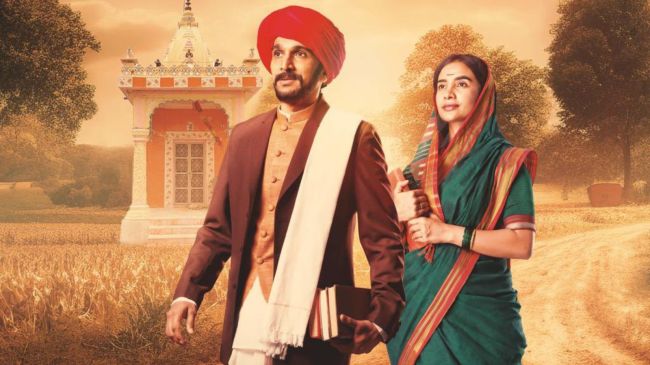Opinion ‘Phule’ appears to be a departure from mainstream historical drama, exploring social justice over martial glory
Whether the film delivers on this promise remains to be seen, but its arrival signals a broader awakening: A recognition that the stories of Bahujan Nayaks deserve not just acknowledgement, but celebration
 The trailer for Phule, directed by Ananth Narayan Mahadevan and released on March 24, marks a refreshing and overdue addition to this evolving cinematic landscape. (Source: IMDb)
The trailer for Phule, directed by Ananth Narayan Mahadevan and released on March 24, marks a refreshing and overdue addition to this evolving cinematic landscape. (Source: IMDb) Written by Neeraj Bunkar
Indian films have rarely engaged deeply with caste or celebrated Bahujan leaders. Figures like Jyotirao Phule were often relegated to the background—mere portraits adorning the walls alongside Savitribai Phule and B R Ambedkar in biopics or social dramas. However, a perceptible shift is underway. The trailer for Phule, directed by Ananth Narayan Mahadevan and released on March 24, marks a refreshing and overdue addition to this evolving cinematic landscape.
Featuring Pratik Gandhi as Jyotirao Phule and Patralekhaa as Savitribai Phule, the trailer promises a compelling portrayal of the couple’s revolutionary contributions. Set to release on April 11 — coinciding with Jyotirao Phule’s birth anniversary—the film appears poised to explore his and Savitribai’s tireless efforts to dismantle caste-based oppression and promote education as a tool for liberation.
This cinematic intervention comes on the heels of Chhaava, a biographical drama about Chhatrapati Sambhaji Maharaj, which hit theatres last month and emerged as a box-office juggernaut. Prime Minister Narendra Modi lauded the film for its depiction of Maratha valour, amplifying its cultural impact. However, Chhaava also ignited controversy. Hindu right-wing groups, emboldened by the film’s portrayal of Mughal emperor Aurangzeb, gave calls to raze his tomb at Khuldabad. Politicians of different shades and hues seized the moment to revisit Mughal-era atrocities, often for partisan gain.
Yet, voices from the Dalit community, particularly the Mahar caste, expressed discontent. They argued that Chhaava erased the significant contributions of Mahar warriors who fought alongside Sambhaji against the Mughals, sacrificing their lives in the process. This critique underscores a recurring tension in Indian cinema: The tendency to foreground dominant caste perspectives while sidelining the struggles of the marginalised.
Regional cinema, particularly in Marathi and Kannada, has made earlier attempts to bring the Phule couple’s story to life, though often with varying degrees of depth and reach. As early as 1954, Pralhad Keshav Atre’s Marathi film Mahatma Phule offered a biographical glimpse into Jyotirao’s reformist zeal, earning praise for its sincerity, if not widespread recognition. Television followed suit with Krantijyoti Savitribai Phule (2016) on DD National and Savitri Jyoti (2020) on Sony Marathi, both dramatising the couple’s contributions to education and social justice. In 2018, the Kannada biopic Savitribai Phule highlighted their legacy for southern audiences, while the 2024 Marathi film Satyashodhak, directed by Nilesh Jalamkar, traced Jyotirao’s journey with a focus on his Satyashodhak Samaj—though it has been criticised for simplifying and dramatising historical events with factual errors for entertainment.
These works, rooted in regional languages and sensibilities, laid the vital groundwork, yet their scope often remained confined to local audiences or leaned toward hagiography over critical exploration. Phule (2025), while embracing a popular cinematic style and familiar tropes, marks a departure by positioning itself as a pan-Indian narrative with mainstream appeal.
Phule seems to offer a counter-narrative — a breath of fresh air in a cinematic landscape often dominated by either jingoistic epics or sanitised social dramas. The trailer hints at a film that doesn’t shy away from the Phules’ radical legacy. Pratik Gandhi’s intense portrayal of Jyotirao and Patralekhaa’s poised depiction of Savitribai suggest a focus on their role as disruptors—exposing the hypocrisy of religious dogma and championing the dignity of the so-called “ex-untouchables.” The visuals evoke the couple’s establishment of schools for girls and Shudras, their defiance of Brahminical norms, and their unwavering commitment to rationality over superstition.
However, the true measure of Phule’s success lies in its depth. Jyotirao Phule’s intellectual contributions—most notably his book Gulamgiri (Slavery), published in 1873—merit serious exploration. In Gulamgiri, Phule dismantled the mythological foundations of Hinduism, ridiculing the unscientific and oppressive nature of caste hierarchies. His establishment of the Satyashodhak Samaj (Truth-seekers’ society) in 1873 furthered this mission, advocating rationality and social equality while rejecting priestly dominance. The Samaj also introduced Satyashodhak marriages—simple, consent-based unions free of Brahmanical rituals—symbolising a break from tradition. If Phule engages meaningfully with these ideas, weaving them into its narrative without dilution, it could stand out as a landmark tribute to the couple’s legacy. Conversely, a superficial treatment risks reducing their story to yet another from an upper-caste lens—filtering radical Bahujan voices into palatable, mainstream tropes.
The timing of Phule’s release is significant. Hindi cinema, while increasingly visible in tackling caste, has yet to fully embrace the Bahujan perspective. The success of Chhaava demonstrates the appetite for historical narratives, but it also highlights their potential to stoke division. Phule, with its focus on social justice over martial glory, could bridge this gap—offering a vision of heroism rooted in education and emancipation rather than conquest. Whether the film delivers on this promise remains to be seen, but its arrival signals a broader awakening: A recognition that the stories of Bahujan Nayaks deserve not just acknowledgement, but celebration.
As India grapples with its past and present, Phule holds the potential to do more than entertain—it could provoke, educate, and inspire. For a nation still wrestling with caste and inequality, the Phules’ message is as urgent as ever.
The writer is a PhD research scholar at Nottingham Trent University, Nottingham, United Kingdom





